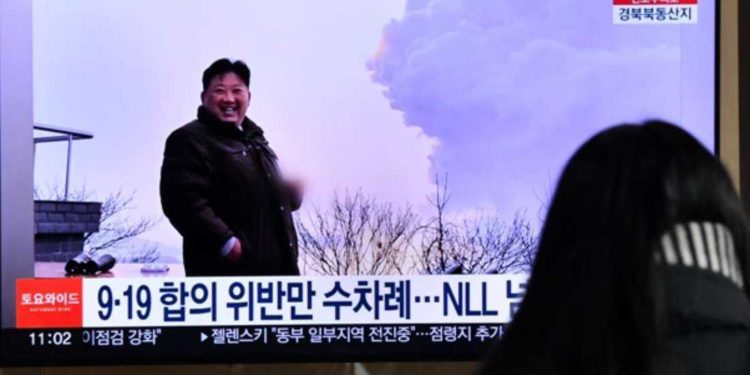Meeting comes at a critical time for both countries and the region as a whole
A woman watches a television screen showing a news broadcast with file footage of North Korean leader Kim Jong-un, at a railway station in Seoul on Dec. 31, 2022. North Korea test-launched an intercontinental ballistic missile just hours before the leaders of South Korea and Japan were to meet at a Tokyo summit on March 16. (Photo: AFP)
The leaders of South Korea and Japan were set to meet in Tokyo on March 16, marking the first formal bilateral summit since 2015. The meeting aims to address long-standing issues between the two countries, including Japan’s occupation of the Korean Peninsula between 1910 and 1945 and its treatment of Korean forced labor and “comfort women” during World War II.
South Korea has offered concessions to Japan on court orders for compensation over wartime forced labor, but it remains to be seen whether the South Korean public will accept reconciliation.
Improved ties between South Korea and Japan could pave the way for the two US allies to cooperate more closely on shared concerns related to China and North Korea.
China has territorial disputes with several countries in the region, including Japan, South Korea, Taiwan, Vietnam, and the Philippines. These disputes often involve conflicting claims over islands, reefs, and maritime boundaries in the East and South China Seas.
“Kim Jong-un recently ordered his military to be ready to repel what he called ‘frantic war preparation moves’ by his country’s rivals”
Also, China’s military modernization and spending have increased significantly over the past decade, and it has developed advanced weapons systems such as aircraft carriers, stealth fighters, and long-range missiles that forced Japan to establish a political course where it could raise its public budget for military assets.
North Korea on the other hand has not wasted time and conducted its third weapons test of the week by launching an intercontinental ballistic missile (ICBM) on March 16; just hours before the leaders of South Korea and Japan were due to meet in the Tokyo summit.
The missile was launched from the North Korean capital, Pyongyang, and flew towards the Korean Peninsula’s eastern waters and likely landed in the waters outside Japan’s exclusive economic zone.
Leader Kim Jong-un recently ordered his military to be ready to repel what he called “frantic war preparation moves” by his country’s rivals, referring to large ongoing drills between the US and South Korea.
But even though Japan and South Korea face an increasing need to cooperate on challenges posed by China and North Korea, the previous rounds of diplomacy have failed over the unresolved issues from Japan’s 35-year occupation of the Korean Peninsula.
Both sides have signaled hopes that this summit will lead to a resumption of regular bilateral visits, although Japan’s Prime Minister, Fumio Kishida, hasn’t yet announced plans for a visit to South Korea.
“The two countries will have to find an accommodation on history if this round of diplomacy is to achieve lasting results”
South Korean President Yoon Suk Yeol will be accompanied by high-profile business leaders who are expected to meet their Japanese counterparts. The two sides are now considering establishing a separate, private fund to promote bilateral economy, culture, and other key areas of cooperation.
While pushing to expand US-South Korea joint military exercises, the Yoon government has sought Washington’s stronger reassurances to swiftly and decisively use its nuclear weapons to protect its ally from North Korea which has been expanding nuclear-capable missiles and issuing threats of preemptive nuclear strikes.
According to experts, the two countries will have to find an accommodation on history if this round of diplomacy is to achieve lasting results. The summit wouldn’t change South Korean public opinion if it’s all about security and economic matters.
“There must be some sort of expression of apology and self-reflection by Japan, in particular by the Japanese government and the defendant companies,” said Choi Eun-mi, an analyst at South Korea’s Asan Institute for Policy Studies.
This summit comes at a critical time for both countries and the wider region as a whole. Improved ties could pave the way for increased cooperation on shared security and economic challenges, but unresolved historical issues may continue to hinder progress.
South Korea must be willing to let go of the wrongs of the past and focus on building a strong alliance for the future. This means engaging in constructive dialogue with Japan to find a mutually acceptable solution to historical issues. It also means acknowledging that Japan is an important ally in the region and that cooperation on shared challenges is essential for regional stability and prosperity.
*The views expressed in this article are those of the author and do not necessarily reflect the official editorial position of UCA News.
Latest News
Credit: Source link




